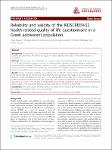Reliability and validity of the KIDSCREEN-52 health-related quality of life questionnaire in a Greek adolescent population
Tzavara, Chara
Tzonou, Anastasia
Zervas, Ioannis
Ravens-Sieberer, Ulrike
Dimitrakaki, Christine
Tountas, Yannis
Background: The KIDSCREEN-52 is a worldwide instrument for measuring health-related quality of life (HRQoL) in children and adolescents. The aim of this study is to assess reliability and validity of the Greek version of KIDSCREEN. Methods: Questionnaires were collected from a representative nationwide sample of 1,194 adolescents aged from 11 to 17 years. Internal consistency reliability was determined by calculation of the Cronbach a coefficient. A confirmatory factor analysis (CFA) was conducted in order to test the construct validity of the questionnaire. Validity was further examined by investigating the correlation of KIDSCREEN with the Strengths and Difficulties Questionnaire (SDQ) and its association with socioeconomic and health-related factors. Results: Internal consistency reliability was accepted with a Cronbach a above 0.73 for all KIDSCREEN dimensions. CFA showed that the ten-dimensional model fitted the data well (root mean square error of approximation (RMSEA) = 0.048, comparative fit index (CFI) = 0.971 and goodness of fit index (GFI) = 0.965). Correlation coefficients between KIDSCREEN and SDQ dimensions were significant. Adolescents of low socioeconomic status reported lower scores in the majority of KIDSCREEN dimensions. Also, adolescents with chronic health problem had poorer quality of life concerning physical well-being and other dimensions of KIDSCREEN. Conclusions: The Greek version of KIDSCREEN-52 was found to have satisfied psychometric properties and could be suitable for assessing HRQoL in Greek adolescents.
Dateien zu dieser Publikation
Keine Lizenzangabe

